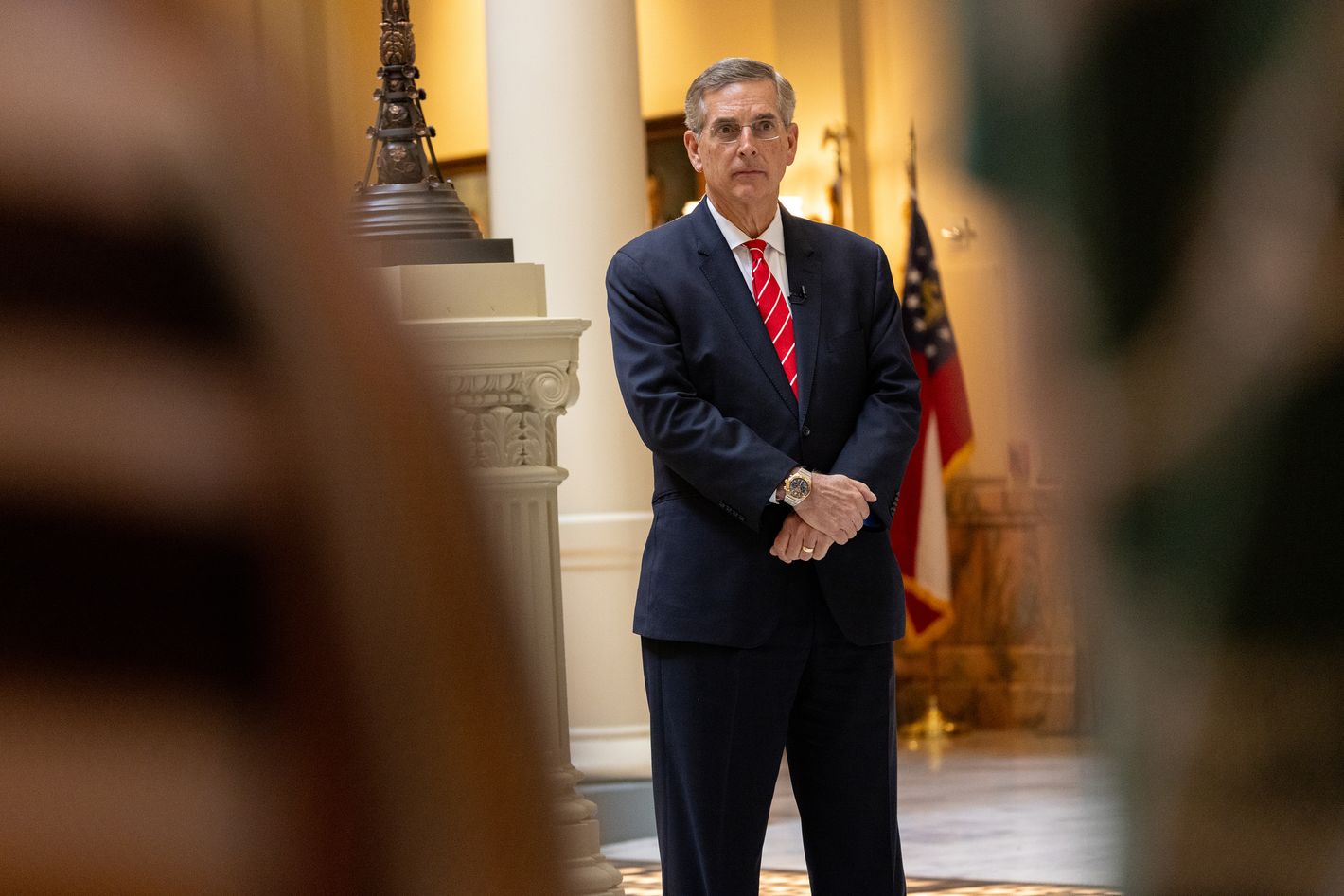 Photo: Nathan Posner/Anadolu/Getty Images
Photo: Nathan Posner/Anadolu/Getty Images
For much of the past decade, Republican politics in the increasingly crucial swing state of Georgia has been dominated by two men whose relationship has been complex and fascinating: Donald Trump and Brian Kemp. Both the two-term president and the two-term governor are lame ducks who still dominate their domains like no one else. And their collision in 2020 over Trump’s “stolen elections” claims, which Kemp refused to countenance, continues to have a major effect on the Georgia GOP as it prepares for a high-stakes 2026 midterm election.
Most of the national attention to Georgia has revolved around Republican efforts to take down freshman senator Jon Ossoff, generally considered the most vulnerable Democratic incumbent in the upper chamber. Kemp himself was the ideal contestant for Republicans, but he turned them down, and has instead devoted much of his political capital to the long-shot candidacy of lifelong friend and former pro- and college-football coach Derek Dooley (son of the legendary University of Georgia coach Vince Dooley). Two House members, Buddy Carter and Mike Collins, are running for the nomination as 1,000 percent MAGA candidates, and there are fears the Trump-Kemp rivalry, which culminated in a 2022 effort to purge Kemp that failed dismally, could contaminate the Senate race and divide the party against the disciplined and well-funded Ossoff.
Meanwhile, the contest to succeed Kemp is becoming very interesting. Two of his allies in the battle with Trump are now running for governor. One of them, Geoff Duncan, was the Republican lieutenant governor when Kemp defied Trump over the 2020 results; he chose not to run for reelection in 2022 and subsequently left the Republican Party altogether, even endorsing Kamala Harris in 2024. He’s entered the Democratic gubernatorial primary. Meanwhile, the statewide officeholder who joined Kemp in certifying Joe Biden’s 2020 win in Georgia, Secretary of State Brad Raffensperger, has just announced he’s running for the GOP nomination. Like Kemp, Raffensperger withstood a Trump-led purge effort in 2022, defeating then-congressman Jody Hice handily in a GOP primary. Another Kemp ally who didn’t face the full wrath of Trump in 2022, Attorney General Chris Carr, is also in the Republican gubernatorial field. And then there’s the unambiguous MAGA candidate, the enormously wealthy Lieutenant Governor Burt Jones, a 2020 Trump “fake elector” who occupied the office Duncan abandoned in 2022. It all feels very claustrophobic.
Oddly enough, while Kemp has poured his soul into Dooley’s Senate bid, he’s kept his distance from the battle for his own office. Carr and Raffensperger are allies, and Jones is a bit of an enemy, but Kemp has simply said he’ll back whoever wins the primary.
Raffensperger’s candidacy has a high floor but perhaps a low ceiling: He has near-universal name recognition thanks to his monumental struggle to resist pressure from Trump to reverse the outcome of the 2020 presidential election and then to survive Trump’s retaliatory purge effort. His campaign will stress his standard-brand conservatism on a wide range of issues, stances that preceded his near-death experience at Trump’s hands. But MAGA folk in Georgia haven’t forgiven him for rejecting a stolen-election myth that has grown even stronger with Trump’s return to power; in June, a Georgia GOP convention passed a resolution to oppose the secretary of State’s right to run in a GOP primary. Another problem for Raffensperger is that he benefited in 2022 from Democratic crossover votes (Georgia has open primaries with no partisan voter registration) that probably won’t be there for him in 2026. It’s unclear how well his exceptionally low-key style will play in another red-hot election cycle; AP reporter Jeff Amy described his 2022 campaign as composed of “quiet speeches before civic club members dozing off after a heavy lunch.”
With multiple candidates in the field, you could envision a Jones-Raffensperger runoff in which all the old wounds from 2020 and 2022 are reexposed, giving Democrats an opening to compete for a position they haven’t held since 2002.
Geoff Duncan’s odds of becoming that Democrat are iffy at best. He has a long record of conservative positions on issues (especially abortion and voting rights) that will not please Democratic-primary voters. He’s also a very white suburban dude in a Georgia Democratic Party increasingly dominated by Black, Latino, and Asian American voters. That could give him a chance to make a runoff with someone from the large field of Black candidates already in the race, notably former Atlanta mayor Keisha Lance Bottoms and long-time state and local elected official Michael Thurmond. A lot of Democratic insiders are gravitating to the campaign of former state legislator Jason Esteves, a youngish pol whose ethnic background is Afro–Puerto Rican. And in the background is the possibility that voting-rights champion and national Democratic celebrity Stacey Abrams could make a comeback after losing to Kemp in 2018 and 2022. She’s been very quiet about her future plans so far but would be the immediate front-runner if she did jump into the race.
All in all, the 2026 Georgia gubernatorial race will be haunted by many ghosts from the recent past and could have big future implications for both major parties going forward, given the state’s likely destiny as must-win territory for Democrats in particular. But if Donald Trump and Brian Kemp stumble into a renewal of their feud, all bets are off.
From Intelligencer - Daily News, Politics, Business, and Tech via this RSS feed

